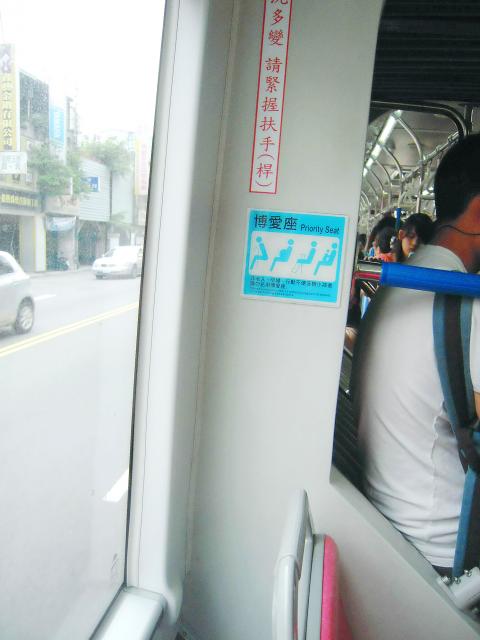Every bus has priority seats, which, in most people’s view, are primarily for elderly people, the disabled, pregnant women and children. A man in his 50s surnamed Chen says that once when he was riding a Bus Rapid Transit (BRT) bus he felt ill and the priority seat in front of him was empty, but he did not dare to sit down. He suggests that priority seats be changed to “seats for those in need” so that anyone who is feeling uncomfortable can sit there.
Lu Chia-chia, head of the Taichung City Government Transportation Bureau’s Transportation Management Section, says that the definition of the phrase“for those in need” is too broad and some people might take advantage of it, such as by saying, “I am using my phone so I need to sit down.” This would then exclude the disadvantaged groups who really need a seat. On the Taipei Metro, as well as Japan’s and Hong Kong’s rapid transport networks, such seats are marked as “priority seat” and not as “for those in need.” Whether Taichung needs to make some changes will need some careful deliberation, and the Taichung City Government Transportation Bureau will discuss the matter with the Public Transportation Office.
Chen says that a few days ago he was taking the BRT from Taichung Train Station to the Taichung Veterans General Hospital. At the time the bus seats were nearly all full and the only vacant one was a priority seat, while some passengers were standing. He felt really ill and wanted to sit down in the empty seat, but he was afraid that people would look askance at him, thinking that a grown man should not occupy a priority seat.

Photo: Su Chin-Feng, Taipei Times
自由時報記者蘇金鳳攝
Chen says that the general public’s general impression of priority seats is that they are only for elderly people, the disabled, pregnant women and children. He therefore suggests that priority seats should be marked as “for those in need” so that anyone who needs to sit there can do so, instead of having to gaze longingly at an empty seat.
(Liberty Times Translated by Clare Lear)
每一輛公車都有博愛座,在一般人想法中,就是要給老弱婦孺優先坐的位子。有一位五十多歲的陳姓中年男子反映,日前他搭乘雙節巴士,當時他的身體相當不舒服,眼見博愛座有空位,又不敢坐;他建議博愛座應改為「有需求者座位」,讓身體不適的任何人皆可坐下。
交通局運輸管理科長盧佳佳表示,「有需求者」定義太廣,有人可 能會扭曲解釋,如「我滑手機也有需求」等,反而排擠真正弱勢需要有位子的民眾;台北捷運及日本、香港則是「博愛優先座」,也不是「有需求者座位」。台中市 是否要修改,真的要非常審慎研議,交通局會跟公共運輸處討論。
陳姓男子說,日前他從台中車站搭雙節巴士要到台中榮總,當時雙節巴士的座位已滿,只剩下博愛座上一個位子,而車子也有一些乘客是站著,他當時已很不舒服,很想坐在空的博愛座上,但又怕別人側目,認為他一個大男人佔什麼博愛座。
陳姓男子表示,博愛座給人既定的印象,就是只有老弱婦孺才能坐,他建議,博愛座應該改設為「有需要者的座位 」,讓任何有需要的人就可坐,不用再望著空椅興嘆。
〔記者蘇金鳳/台中報導〕

A: Wow, Les Miserables Staged Concert Spectacular is visiting Taiwan for the first time. B: Isn’t Les Miserables often praised as one of the world’s four greatest musicals? A: Yup. Its concert is touring Taipei from tonight to July 6, and Kaohsiung between July 10 and 27. B: The English version of the French musical, based on writer Victor Hugo’s masterpiece, has been a huge success throughout the four decades since its debut in 1985. A: The musical has never toured Taiwan, but going to the concert sounds like fun, too. A: 哇,音樂劇《悲慘世界》紀念版音樂會首度來台巡演! B: 《悲慘世界》……它不是常被譽為全球四大名劇之一嗎? A: 對啊音樂會將從今晚到7月6日在台北演出,從7月10日到27日在高雄演出。 B: 這部法文音樂劇的英文版,改編自維克多雨果的同名小說,自1985年首演以來,在過去40年造成轟動。 A:

Some 400 kilometers above the Earth’s surface, the “International Space Station” (ISS) operates as both a home and office for astronauts living and working in space. Astronauts typically stay aboard the station for up to six months and engage in groundbreaking research projects in various fields, such as biology, physics and astronomy. These projects help scientists understand life in space and contribute to advancements that benefit people on Earth. The ISS has experienced significant growth since construction began in 1998. The station’s design and assembly represent an extraordinary international collaboration among Canada, the European Union, Japan, Russia and the United States.

A: While hit musical Les Miserables’ concert tour kicks off, South Korean drama Squid Game 3 will be back at the end of this month. B: New Taiwanese dramas The World Between Us 2 and Zero Day Attack have also gained attention. A: I heard that Zero Day Attack is a story about the Chinese Communist Party’s People’s Liberation Army trying to attack Taiwan by force. B: The drama’s subject is so sensitive that it has sparked a lot of controversy in society. A: I just hope that such a horrible story will never happen in

Continued from yesterday(延續自昨日) https://www.taipeitimes.com/News/lang Living on the ISS is challenging due to the absence of gravity. Astronauts must strap themselves into sleeping bags to prevent floating away while they sleep. They also spend about two hours exercising daily using specialized equipment. Despite this, microgravity can cause muscle loss, bone density reduction and cardiovascular changes. As a result, astronauts require extensive rehabilitation upon their return to Earth. In spite of these difficulties, astronauts often describe their experience on the ISS as life-changing. One of the most awe-inspiring aspects of living aboard the space station is the unparalleled view of Earth. Traveling at